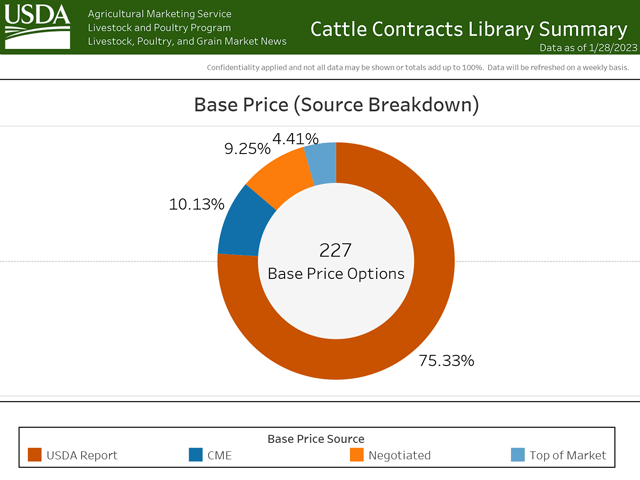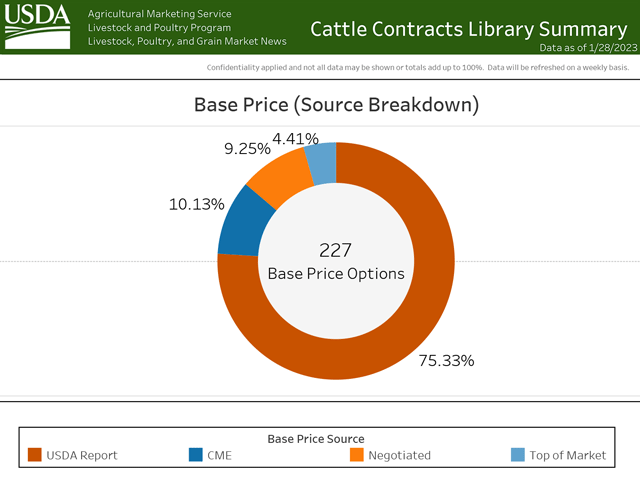Ag Policy Blog
Cattle Contract Library Website Goes Live
The library, operated by the Agricultural Marketing Service (AMS), is expected to offer cattle producers and the public more details on marketing arrangements including terms, conditions and volumes under which cattle are contracted, USDA stated, "bringing sunshine to practices in what is now the largest part of the cattle market."
USDA stated the Cattle Contract Library "will empower cattle producers to negotiate better terms, more carefully monitor risks relating to marketing preferences and pricing practices, and ultimately take better advantage of market opportunities to produce cattle that the market demands."
Cattle producers increased demand for a Cattle Contract Library after seeing record spreads between live fed cattle prices and boxed beef prices in 2019 and 2020 following a fire at a Tyson plant in Kansas and the pandemic shutdowns that affected processing plants. Cattle producers and others also argue fewer cattle are sold through negotiated cash trade as well. Alternative Marketing Arrangements (AMAs) now account for more than 70% of sales to packers.
USDA was authorized to create the pilot library in a 2022 funding bill. USDA stated the website will work similar to a library model developed and shared with stakeholders last year. Packers that slaughter an average of at least 5% of fed cattle nationally over the last five calendar years were required to submit information to AMS for the library. USDA had published a final rule on Dec. 7, 2022, that became effective on Jan. 6.
"USDA is committed to creating a more level playing field for cattle producers and a more balanced, equitable economy for everyone working in food and agriculture," Agriculture Secretary Tom Vilsack said. "The Cattle Contracts Library Pilot Program supports this commitment by providing producers with the market information they need to make informed production, marketing, and business decisions."
P[L1] D[0x0] M[300x250] OOP[F] ADUNIT[] T[]
The library includes "a range of terms and information contained in active contracts used for the purchase of fed cattle." USDA added, "In addition to active contracts in use, the library will provide information on terms most commonly used in cattle contracts, such as base price determination, base price adjustments and selling basis options; contract specifications for such things as quality, yield, breed, weight, delivery, financing, profit/risk-sharing, and more (where present in a contract); and the full range of premiums and discounts used in final price determination."
As the library increases its data, the library also will display information on the number of cattle moving through contracts defined by base price source, including numbers from the prior month and estimates for the current month. Volume information on contracts regarding "quality, breed, weight, source-verified and other details will provide users with information about each specification and how they are used. USDA added, "During the term of the pilot, AMS expects to further enhance transparency through additional reports and features as they are developed, subject to confidentiality."
Information reported on the website so far shows base prices, and main options for setting those base prices. For more than 75% of the contracts, the base price was set by a USDA report such as the 5-Area direct slaughter report. The Kansas and Nebraska weekly direct slaughter reports were the most commonly used reports for setting the base price.
The report also lists various premiums and discounts, showing the average paid, the average for the bottom 25% and the average for the top 25%. For instance, the average Choice premium per cwt was $13.03 per cwt, the average 25% percentile received $6.42 per cwt and the top 75% percentile received $20.94 per cwt.
The announcement of the Cattle Contract Library comes as the National Cattlemen's Beef Association (NCBA) and the Cattlemen's Beef Board meet this week in New Orleans.
"We have been looking forward to the launch of the Cattle Contract Library pilot program and will review the product to determine if its current format provides value to cattle producers," said Tanner Beymer, NCBA's senior director for government affairs. "We will continue engaging with officials at the U.S. Department of Agriculture and providing feedback on this resource."
In the coming months, USDA will provide more information about marketing practices and trends as well. AMS also will conduct a series of meetings and webinars in the coming weeks. The first is scheduled for Feb. 8 at 10 a.m. Central. Details on that webinar can be found on the Cattle Contract Library website: https://www.ams.usda.gov/…
Chris Clayton can be reached at Chris.Clayton@dtn.com
Follow him on Twitter @ChrisClaytonDTN
(c) Copyright 2023 DTN, LLC. All rights reserved.






Comments
To comment, please Log In or Join our Community .